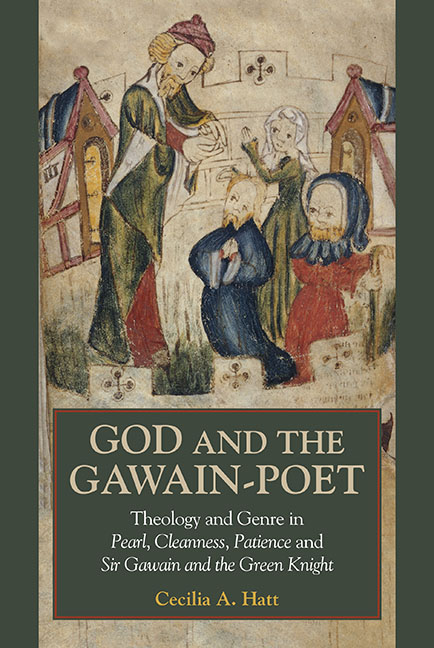 God and the Gawain-Poet
God and the Gawain-Poet Book contents
- Frontmatter
- Dedication
- Contents
- Preface and Acknowledgements
- Abbreviations
- Introduction: Signposts on the Trail of the Gawain-Poet
- Chapter 1 Pearl, the Jeweller’s Dream
- Chapter 2 The Difficulty of Cleanness
- Chapter 3 Patience and the Book of Jonah
- Chapter 4 Sir Gawain and the Green Knight: an Alternative Romance?
- Appendix: some Biographical and Contextual Speculations
- Select Bibliography
- Index
Chapter 3 - Patience and the Book of Jonah
Published online by Cambridge University Press: 07 May 2022
- Frontmatter
- Dedication
- Contents
- Preface and Acknowledgements
- Abbreviations
- Introduction: Signposts on the Trail of the Gawain-Poet
- Chapter 1 Pearl, the Jeweller’s Dream
- Chapter 2 The Difficulty of Cleanness
- Chapter 3 Patience and the Book of Jonah
- Chapter 4 Sir Gawain and the Green Knight: an Alternative Romance?
- Appendix: some Biographical and Contextual Speculations
- Select Bibliography
- Index
Summary
PATIENCE is the second of the Beatitude-poems in this collection and is on the face of it as different from Cleanness as could be. It is short, brisk and funny. In Patience, as in Cleanness, God observes the wickedness of human beings and sends a prophet to rebuke them, but instead of destroying them in the whirlwind he has threatened, he relents and forgives the repentant Ninevites. It is not God who is stern and unforgiving, but the reluctant prophet, Jonah. The Biblical book of Jonah gives Jonah this character, but in Patience it is shown to be ridiculous as well as regrettable. Patience and Cleanness are thus different sides of the same coin: it is as if Jonah stands for those readers or hearers of Cleanness who might have missed the point, basking in their own virtue while deploring the wickedness of the men of old. The good people in Cleanness do all they can to save the others: they negotiate, plead and explain, but they do not judge, because only God can judge human acts and dispositions. Jonah, however, persists in judging; he is consistently unaware, as we should say, of what it is his place to do and say. Most of the action of Patience, in fact, revolves around Jonah's mistaken ideas of where his rightful place is, and in this the poem reflects the poet's characteristic interest in placings. It is also typical that it implicitly carries on from Cleanness that poem's concern with ‘seeing God’ as important above all other things. Although it offers an obvious moral message in the showing of Jonah's actions as disobedient, Patience goes to some length to demonstrate how Jonah's behaviour is a result of his considering only his own situation, his own motivation and his own safety as necessary agents in the story rather than looking at the unlimited mercy of God, which is in effect the only actor. This chapter hopes to illuminate both the fun and the seriousness of Patience, arguing that, just as Jewish commentators have done, the English poet sees the joke in the Bible story and transforms it into a poem that is distinctively his own.
- Type
- Chapter
- Information
- God and the Gawain-PoetTheology and Genre in <I>Pearl, Cleanness, Patience</I> and <I>Sir Gawain and the Green Knight</I>, pp. 124 - 167Publisher: Boydell & BrewerPrint publication year: 2015
